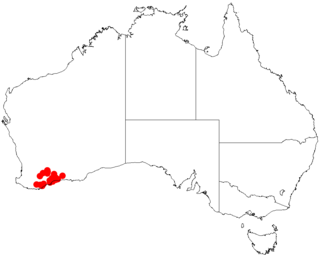
Acacia gibbosa is a shrub or tree belonging to the genus Acacia and the subgenus Juliflorae native to Western Australia.

Acacia latior is a shrub belonging to the genus Acacia and the subgenus Juliflorae that is endemic to western Australia.

Acacia cassicula is a shrub of the genus Acacia and the subgenus Plurinerves that is endemic to an area of south western Australia.

Acacia dissona is a shrub of the genus Acacia and the subgenus Plurinerves that is endemic to an area of south western Australia.

Acacia donaldsonii is a shrub of the genus Acacia and the subgenus Plurinerves that is endemism in an area of south western Australia.

Acacia kenneallyi is a shrub or tree of the genus Acacia and the subgenus Plurinerves that is endemic to north western Australia.

Acacia multisiliqua is a shrub or tree of the genus Acacia and the subgenus Plurinerves that is endemic to northern Australia.

Acacia nivea is a shrub of the genus Acacia and the subgenus Plurinerves that is endemic to south western Australia.

Acacia nyssophylla, commonly known as pin bush, wait a while and spine bush, is a shrub of the genus Acacia and the subgenus Plurinerves that is endemic to a large area of central and south-western and southern Australia.
Acacia papulosa is a shrub of the genus Acacia and the subgenus Plurinerves that is endemic to a small area along the south coast of south western Australia.
Acacia pelophila is a shrub of the genus Acacia and the subgenus Plurinerves that is endemic to a small area along the west coast of western Australia.

Acacia pharangites, commonly known as Wongan gully wattle, is a shrub of the genus Acacia and the subgenus Plurinerves that is endemic to a small area of south western Australia and is listed as endangered according to the Environment Protection and Biodiversity Conservation Act 1999.

Acacia recurvata, commonly known as the recurved wattle, is a shrub of the genus Acacia and the subgenus Plurinerves that is endemic to a small area of western Australia.

Acacia speckii is a shrub or tree of the genus Acacia and the subgenus Plurinerves that is endemic to a small area in central western Australia.

Acacia subsessilis is a shrub of the genus Acacia and the subgenus Plurinerves that is endemic to an area of western Australia.

Acacia tetanophylla is a shrub of the genus Acacia and the subgenus Plurinerves that is endemic to an area of south western Australia.

Acacia trulliformis is a shrub of the genus Acacia and the subgenus Plurinerves that is endemic to an area of south western Australia.

Acacia undosa is a shrub of the genus Acacia and the subgenus Plurinerves that is endemic to an area of south western Australia.

Acacia vittata, commonly known as Lake Logue wattle, is a shrub of the genus Acacia and the subgenus Plurinerves that is endemic to a small area in western Australia.

Acacia warramaba is a shrub of the genus Acacia and the subgenus Plurinerves that is endemic to an area of south western Australia.


















